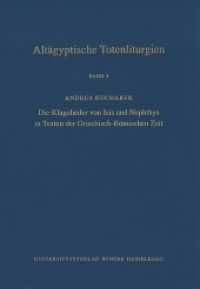Full Description
Drawing on a corpus of 113 narratives told by migrant workers who have returned to their home country, Ladegaard details Indonesian and Filipina (domestic) migrant workers' experiences of homecoming after years of work abroad, separated from their loved ones.
The narratives deal with two major themes: 1) Migrant workers' experiences in the diaspora, which for many, particularly Indonesian workers, were associated with abuse and exploitation leading to trauma; and 2) migrant workers' experiences of coming home, which include both the happy reunion with the family but also concerns about not 'fitting in' and the need to reinvent themselves because they are not who they were when they left. This is particularly true for workers whose migratory journeys have failed and who have come back to their hometowns without any financial award. Chapters also explore the major difference between Filipina and Indonesian migrant workers' overseas experiences. The Filipina returnees share mostly positive stories while the Indonesian returnees uncover mostly negative stories, further illuminating what may explain these diverse migratory experiences. Finally, the book discusses how research on disenfranchised groups like (domestic) migrant workers can be used for social and political action.
An excellent text that will appeal to academics, teachers and postgraduate students in the humanities and social sciences, particularly in sociolinguistics, applied linguistics, intercultural communication, anthropology, and migration studies.
Contents
1. Setting the scene 2. How and Why: A Dash of Theory and Methodology 3. Struggling to Reconnect: Identity Transformations 4. Haunted by Ghosts: Remembering Trauma 5. Spurning Exploitation: The Empowered Migrant Worker 6. Sinking and Drowning, or Surviving and Thriving 7. Reflexivity and Social Activism in Migrant Worker Research 8. Summary and Concluding Remarks








